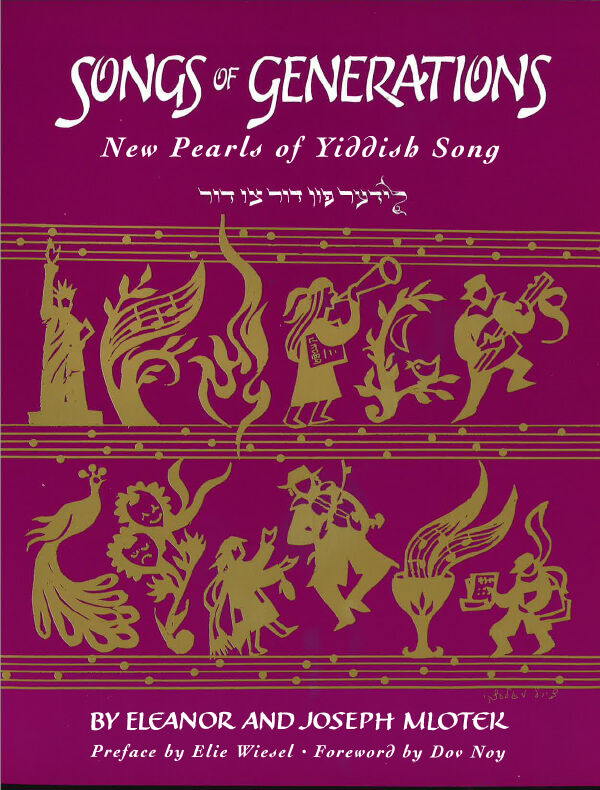Folksong which uses the Hebrew alphabet to humorously contrast the differences between rich and poor. Published by Menakhem Kipnis in 1925. The melody is based on the traditional Ashkenazic tune for the Akdomes poem. (see Max Wohlberg, “The Music of the Synagogue as a Source of the Yiddish Folk Song”). Kipnis has another tune with the Akdomes motive: “Alef-an odler tut untern himl flien” (A is for an eagle that flies beneath the sky).

Alef is for turkeys, the rich man eats,
Beys is for bones, the poor man gnaws.
Gimel is for geese, the rich man eats,
Daled is for poverty the poor man has.
Hey is for chickens, the rich man eats them fried,
Vov is for the aches and pains the poor man has.
Zayin is for rolls and butter the rich man eats,
Khes is for the diseases the poor man has.
Tes is for the roast squabs the rich man eats,
Yud is for the suffering the poor man has.
Kof is for the galoshes the rich man wears,
Lamed is for the bast shoes the poor man wears.
Mem is for the liquor the rich man drinks,
Nun is for sober, which the poor man is.
Samekh is for the velvet shoes the rich man wears,
Ayin, the poor man goes around in tatters.
Pey is for the gizzards the rich man eats,
Tsadik is for the troubles the poor man has.
Kuf is for the fried cutlets the rich man eats,
Reysh is for the radishes the poor man gnaws.
Shin is for Sherevesky’s cigarettes the rich man smokes,
Tof is for tutin, the weeds the poor man puffs.
Alef — indikes est der nogid,
Beyz — beyndelekh grizhet der oreman.
Giml — gendzelekh est der nogid,
Daled — dem dales hot der oreman.
Hey — hindelekh gepreglte est der nogid,
Vov — veytikn hot der oreman.
Zayen — zeml mit puter est der nogid,
Khes — khalasn hot der oreman.
Tes — taybelekh gebrotene est der nogid,
Yud — yesurim hot der oreman.
Kof — kaloshn trogt der nogid,
Lamed — laptshes trogt der oreman.
Mem — mashke trinkt der nogid,
Nun—nikhter iz der oreman.
Samekh — sametene kleyder trogt der nogid,
Ayen — opgerisn geyt der oreman.
Pey — pupkes gebrotene est der nogid,
Tsadik — tsores hot der oreman.
Kuf — kotletn gepreglte est der nogid,
Reysh — retekh grizhet der oreman.
Shin — Shereshevskis* papirosn reykhert der nogid,
Tof — tutin pipket der oreman.
אַלף — אינדיקעס עסט דער נגיד,
בית — בײנדעלעך גריזשעט דער אָרעמאַן.
גימל — גענדזעלעך עסט דער נגיד,
דלת — דעם דלות האָט דער אָרעמאַן.
הא — הינדעלעך געפּרעגלטע עסט דער נגיד,
ואו — וױיטיקן האָט דער אָרעמאַן.
זין — זעמל מיט פּוטער עסט דער נגיד,
חית — חלאתן האָט דער אָרעמאַן.
טית — טײַבעלעך געבראָטענע עסט דער נגיד,
יוד — יסורים האָט דער אָרעמאַן.
כּף — קאַלאָשן טראָגט דער נגיד,
למד — לאַפּטשעס טראָגט דער אָרעמאַן.
מם — משקה טרינקט דער נגיד,
נון — ניכטער איז דער אָרעמאַן.
סמך — סאַמעטענע קלײדער טראָגט דער נגיד,
עין — (ע)אָפּגעריסן גײט דער אָרעמאַן.
פֿא — פּופּקעס געבראָטענע עסט דער נגיד,
צדיק — צרות האָט דער אָרעמאַן.
קוף — קאָטלעטן געפּרעגלטע עסט דער נגיד,
ריש — רעטעך גריזשעט דער אָרעמאַן.
שין — שערעשעװסקיס* פּאַפּיראָסן רײכערט דער נגיד,
תּיו — תּותּין (טוטין) פּיפּקעט דער אָרעמאַן.
Song Title: Alef-indikes

The Songs of Generations: New Pearls of Yiddish Song anthology comprises songs that were either never printed before or appeared in rare and inaccessible publications — sometimes in different versions and without proper sources. Most of the songs in this book were submitted by readers of Chana and Yosl’s column “Perl fun der yidisher poezye” (Pearls of Yiddish Poetry) in the Yiddish newspaper Der Forverts (The Forward), initiated in October, 1970. Over 25 years, thousands of songs were collected in correspondence and on cassettes from readers throughout the world, and they represent a veritable national Yiddish song archive. Chana Mlotek, in her introduction, writes, “In the course of years the inquiries, contributions and enthusiasm of these readers have kept our own interest unflagging and have reinforced our dedication to this effort. And in recent years our participants have also been augmented by new readers from the former Soviet Russia, who receive our newspaper there or from newly-arrived immigrants in this country and Israel.”